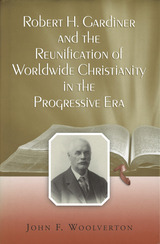2 books about Woolverton, John F.

The Education of Phillips Brooks
John F. Woolverton
University of Illinois Press, 1995
Brooks's theological and intellectual lineage
The Education of Phillips Brooks probes the formative years of one of the best-known figures of Victorian America's "Gilded Age". Rigorously researched, bringing as yet untapped archival material into play, John F. Woolverton's book is an extremely readable and fascinating look at a gifted, persuasive clergyman and public figure. The sermon Brooks delivered at his Holy Trinity Church in Philadelphia while Abraham Lincoln's body lay in state overnight in Independence Hall was published, making him nationally famous overnight. He also is known for penning the lyrics to "O Little Town of Bethlehem". Although Brooks was not a major theologian, he was nurtured in an atmosphere of serious religious thought. In the crisis era of pre-Civil War America, he sought a religious and cultural ideal in the "perfect manhood" of Jesus Christ and consequently "won a name" for himself, as his slightly envious cousin, Henry Adams, once remarked. Woolverton places Brooks in his cultural context and shows how this religious leader was shaped psychologically and by his times and how those factors helped him forge a spiritual ideal for a troubled nation.
The Education of Phillips Brooks probes the formative years of one of the best-known figures of Victorian America's "Gilded Age". Rigorously researched, bringing as yet untapped archival material into play, John F. Woolverton's book is an extremely readable and fascinating look at a gifted, persuasive clergyman and public figure. The sermon Brooks delivered at his Holy Trinity Church in Philadelphia while Abraham Lincoln's body lay in state overnight in Independence Hall was published, making him nationally famous overnight. He also is known for penning the lyrics to "O Little Town of Bethlehem". Although Brooks was not a major theologian, he was nurtured in an atmosphere of serious religious thought. In the crisis era of pre-Civil War America, he sought a religious and cultural ideal in the "perfect manhood" of Jesus Christ and consequently "won a name" for himself, as his slightly envious cousin, Henry Adams, once remarked. Woolverton places Brooks in his cultural context and shows how this religious leader was shaped psychologically and by his times and how those factors helped him forge a spiritual ideal for a troubled nation.
[more]

Robert H. Gardiner and the Reunification of Worldwide Christianity in the Progressive Era
John F. Woolverton
University of Missouri Press, 2005
In his time, Robert Hallowell Gardiner III (1855–1924) was the heart and soul of the Progressive Era’s movement to establish cooperation among all Christian churches. Gardiner’s legacy today is the World Council of Churches. From his home on the Kennebec River and from the Maine town that bears his family’s name, Gardiner carried on an extensive letter-writing campaign on behalf of the reunion of worldwide Christianity. John F. Woolverton incorporates Gardiner’s eleven thousand letters, as well as his published speeches and articles and family records, to present the first biography of a man who was a seminal figure in the early twentieth-century Christian ecumenical movement.
Gardiner was remarkable in that, as a layperson in the traditionally clergy-dominated, hierarchical Episcopal Church, he was able to bring along his own often reluctant denomination, as well as the Eastern and Russian Orthodox churches, major American and European Protestant bodies, and for a time the Roman Catholic Church itself. In addition, in the 1890s Gardiner was a leader in Boston’s famous Social Gospel, moving on to the Young Manhood Movement of the 1910s. He was an outspoken advocate for giving women a voice and vote in the church, as well as a leader in the major 1916 revision of Christian education in his denomination.
In his study, Woolverton analyzes Gardiner’s commitment as an internationalist to multilateral peace efforts on the threshold of World War I. He also discusses Gardiner’s relationships with well-known figures from that era: U.S. Senator George Wharton Pepper, Francis Stetson, John R. Mott, Newman Smyth, Mary Kingsbury Simkhovitch, John J. Wynne, Cardinal James Gibbons, Episcopal Bishop Charles Henry Brent, and Vida D. Scudder.
Woolverton shows how, despite the ravages of war, Gardiner was able to build a vast network of cooperating political and religious leaders. American historians of the Progressive Era, church historians, and theological students will welcome this valuable addition to the historical literature on the social gospel.
[more]
READERS
Browse our collection.
PUBLISHERS
See BiblioVault's publisher services.
STUDENT SERVICES
Files for college accessibility offices.
UChicago Accessibility Resources
home | accessibility | search | about | contact us
BiblioVault ® 2001 - 2024
The University of Chicago Press









